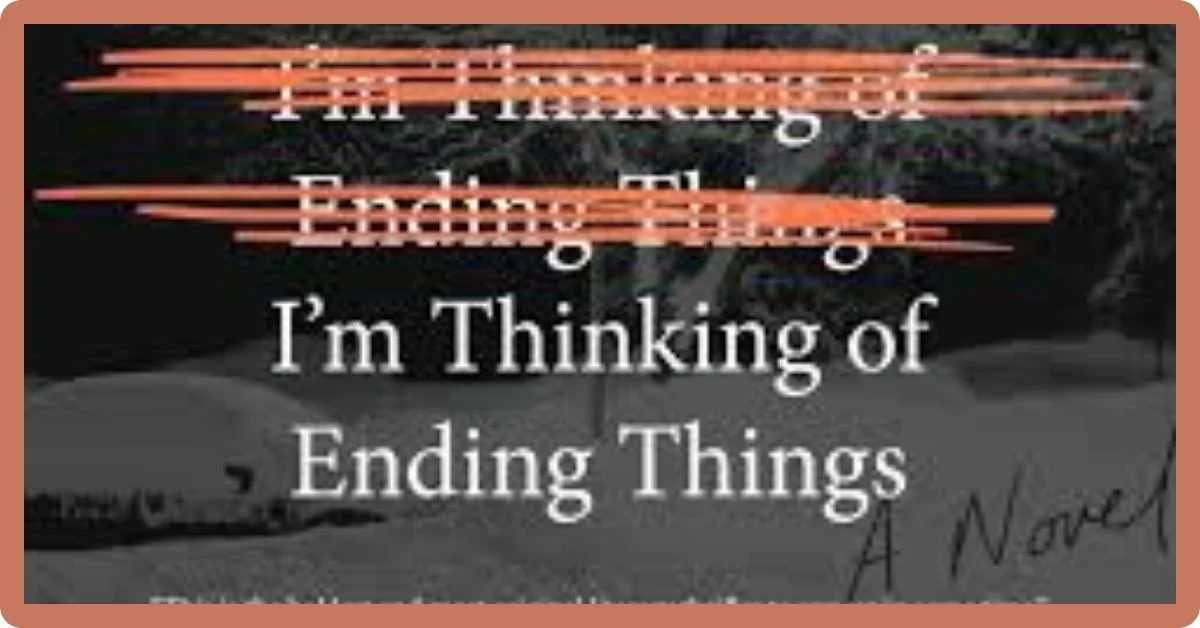In Iain Reid’s 2016 psychological suspense novel I’m Thinking of Ending Things, readers are taken on a haunting journey through the fragmented and unsettling landscape of the human mind. This gripping narrative probes into questions of identity, perception, fear, free will, and the human need for connection—making it one of the most chilling and thought-provoking books in contemporary literature. Its taut, tense atmosphere lingers long after the last page is turned, earning comparisons to the works of authors like Jose Saramago, Michel Faber, and Lionel Shriver. In fact, it’s easy to see how Reid’s debut has captivated audiences and critics alike for its masterful exploration of existential dread and psychological terror.
This article explores the novel’s complex themes and psychological depth, providing an in-depth look at the story’s characters, structure, and its broader implications about life, identity, and the human experience.
Overview of the Plot
I’m Thinking of Ending Things opens with an unnamed protagonist who is in a relationship with Jake, a man she’s been dating for a while. The novel begins with the woman—referred to only as “the girlfriend”—contemplating her decision to break up with Jake. As the couple embarks on a road trip to visit Jake’s family farm, she is riddled with doubts about the relationship, her own identity, and the path her life is taking.
I’m Thinking of Ending Things early scenes are marked by discomfort. The woman is unsure of who Jake truly is, what their relationship means, or even her own feelings toward him. Throughout the journey, a sense of dread builds as she notices strange things about the world around her. She becomes increasingly aware of discrepancies in her perception, and her thoughts begin to spiral into darker, more surreal territories. It’s not just the physical journey to the farm that is unsettling; it’s the psychological journey the protagonist undergoes that grips the reader.
Once they arrive at Jake’s family farm, the protagonist’s sense of reality starts to unravel. The family home is eerily empty, and Jake’s parents, whom she has never met before, are oddly distant and unwelcoming. As events become more bizarre, the protagonist’s grasp on the narrative begins to falter. Her thoughts spiral deeper into a disturbing conclusion, revealing a web of secrets, fractured memories, and mind-bending twists.
By the end, I’m Thinking of Ending Things takes on a surreal, almost Kafkaesque tone. The protagonist’s journey becomes less about the external world and more about her inner consciousness—her attempts to understand herself and make sense of her existence. The novel culminates in a chilling, unpredictable conclusion that leaves the reader questioning the nature of reality and identity.
Psychological Tension and Horror
The defining feature of I’m Thinking of Ending Things is its slow-building psychological tension. From the very beginning, the novel immerses the reader in a state of discomfort. The first-person perspective of the unnamed protagonist creates a sense of intimacy and immediacy, but it also amplifies the unease as her inner thoughts become increasingly disjointed and unreliable. Her constant second-guessing, combined with her inability to understand or trust the world around her, mirrors the feeling of being trapped inside one’s own mind—caught in a loop of doubt and fear.
This disorientation is not just a stylistic choice; it serves as a metaphor for the novel’s exploration of identity and consciousness. The protagonist is unsure of who she is, and as the narrative unfolds, her grasp on reality becomes more tenuous. Is she the same person she thought she was? Is the world around her even real, or is it a projection of her fractured mind? These questions lie at the heart of Reid’s work, creating a chilling atmosphere that plays with the reader’s expectations and sense of reality.
What makes the novel even more unsettling is its subtle incorporation of horror. While there are no outright supernatural elements, the novel evokes a sense of existential horror by exploring the fragility of the mind and the uncertainty of existence. The protagonist’s descent into confusion, coupled with her increasing awareness of the strangeness around her, mirrors the psychological terror of losing one’s sense of self.
I’m Thinking of Ending Things eerie, almost uncanny atmosphere is reminiscent of the work of other authors who specialize in psychological horror, such as Michel Faber’s Under the Skin or Lionel Shriver’s We Need to Talk about Kevin. Like these authors, Reid’s novel lingers in the space between reality and delusion, forcing the reader to confront uncomfortable truths about the human condition.
Themes of Solitude, Fear, and Relationships
One of the most profound aspects of I’m Thinking of Ending Things is its exploration of solitude and the fear that accompanies it. The protagonist is, at her core, isolated—not just from Jake, but from her own understanding of herself. Her sense of alienation extends to her relationship with Jake, who, despite being physically present, feels distant and unknowable. As the novel progresses, the tension between the protagonist’s need for connection and her increasing isolation becomes more pronounced.
The tension in their relationship is mirrored by the isolation of the family farm itself, a place that feels frozen in time and empty of warmth. The protagonist’s inability to understand Jake’s past and the disjointed nature of their interactions highlights the limitations of human relationships. It’s a stark commentary on the difficulty of truly connecting with others, especially in a world that feels increasingly disconnected.
At the heart of this exploration is a meditation on the value of relationships themselves. The protagonist’s contemplation of ending her relationship with Jake is not just about her feelings toward him, but about her own inability to reconcile her identity within the context of another person’s life. She is torn between the need for companionship and the fear of losing herself in the process.
In this way, I’m Thinking of Ending Things touches on a universal fear—the fear of becoming so absorbed in another person that one loses sight of oneself. Reid taps into the existential anxiety that arises from relationships, presenting them as both a source of comfort and a potential source of disillusionment.
Themes of Free Will and Consciousness
Another central theme in I’m Thinking of Ending Things is the question of free will and the nature of consciousness. As the protagonist grapples with her own thoughts and feelings, she begins to question whether she is truly in control of her actions. Are her decisions her own, or is she simply playing out a script that has already been written for her?
The novel delves into the tension between free will and determinism, asking whether human beings have the power to shape their own lives or if they are subject to forces beyond their control. This is explored through the protagonist’s relationship with Jake, which feels both inevitable and out of her control. Her journey to the farm is like a predetermined path, and her reflections on her life suggest a growing realization that she may not have the agency she once thought she did.
The uncertainty about free will is also reflected in the novel’s structure. The narrative feels fragmented and non-linear, adding to the sense that the protagonist is trapped in a cycle of repetition. This sense of inevitability is heightened by the unsettling atmosphere that pervades the story, where even the smallest actions seem to carry a weight of cosmic significance.
Narrative Structure and Style
The structure of I’m Thinking of Ending Things plays a crucial role in creating the sense of unease that defines the novel. The narrative unfolds through the protagonist’s internal monologue, but this perspective is unreliable. She is constantly second-guessing herself, and as the novel progresses, her thoughts become increasingly disjointed. Reid uses this technique to great effect, creating a sense of psychological instability that mirrors the protagonist’s deteriorating sense of reality.
I’m Thinking of Ending Things prose is sparse, almost minimalist, with Reid choosing to convey emotion and tension through implication rather than explicit description. This adds to the haunting atmosphere, as the reader is left to piece together the meaning behind the protagonist’s fragmented thoughts. The ambiguity of the narrative, along with the unsettling silences and pauses in the dialogue, enhances the novel’s psychological horror.
In many ways, I’m Thinking of Ending Things is a meta-narrative about the act of storytelling itself. As the protagonist questions her own identity and reality, the novel itself becomes an exploration of how stories shape our perceptions of the world and ourselves. Reid plays with the expectations of the reader, subverting traditional narrative structures and forcing us to confront the limitations of our own understanding.
Conclusion
I’m Thinking of Ending Things is a masterful exploration of fear, identity, and the fragile nature of consciousness. Through its unnerving psychological tension, Reid takes readers on a harrowing journey into the depths of the human psyche, exploring themes of isolation, free will, and the complexities of human relationships. The novel’s eerie, atmospheric tone and its reliance on ambiguity create a sense of dread that lingers long after the story has ended.
By the time the novel reaches its devastating conclusion, readers are left with more questions than answers—a deliberate choice by Reid that forces us to reckon with the uncertainty and complexity of our own existence. I’m Thinking of Ending Things is a brilliant, disquieting debut that challenges our perceptions of reality and forces us to confront the deepest fears of the human experience.
Frequently Asked Questions (FAQs)
- What is the main theme of I’m Thinking of Ending Things? The main theme of I’m Thinking of Ending Things revolves around the fragility of identity and consciousness. It explores existential questions about free will, the nature of relationships, and the fear of losing oneself in the process of connecting with others.
- Is I’m Thinking of Ending Things a horror novel? While I’m Thinking of Ending Things doesn’t fall squarely into the genre of traditional horror, it contains elements of psychological horror. The novel’s eerie atmosphere, surreal narrative, and focus on existential dread create a sense of unease and tension that is deeply unsettling.
- How does the novel explore the idea of free will? The novel raises questions about whether the protagonist has control over her own life or if she is merely playing out a predetermined role. Throughout the story, the protagonist wrestles with the idea of free will and the possibility that her actions may not be entirely her own.
- Why is the protagonist in I’m Thinking of Ending Things unnamed? The unnamed protagonist serves to enhance the sense of alienation and identity crisis that runs throughout the novel. By not naming her, Reid allows the character to feel more universal and less grounded in a specific identity, highlighting the novel’s themes of self-perception and existential doubt.
- What is the significance of the road trip in the novel? The road trip to Jake’s family farm represents a journey both physically and psychologically. As the protagonist moves closer to the farm, her sense of reality becomes increasingly distorted, symbolizing her internal unraveling and the disintegration of her sense of self.
- How does the novel end? The novel’s ending is deliberately ambiguous and unsettling. Without giving away spoilers, it involves a dramatic shift in perception that forces the reader to reconsider everything that has come before. The conclusion leaves readers with a sense of disorientation and questions about the nature of reality and identity.









